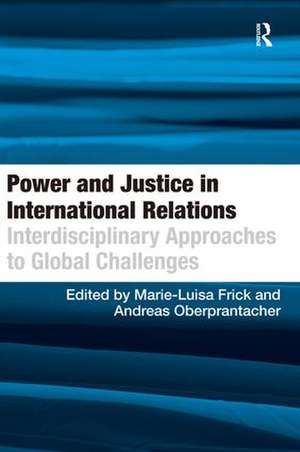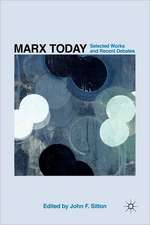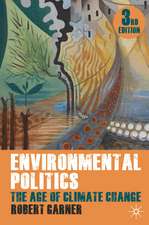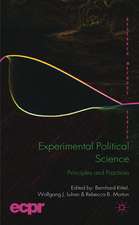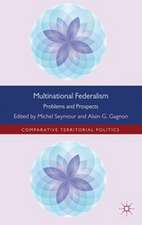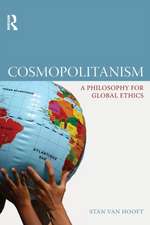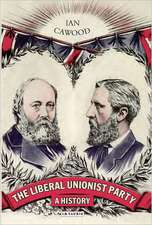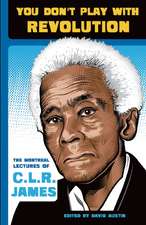Power and Justice in International Relations: Interdisciplinary Approaches to Global Challenges
Autor Andreas Oberprantacher Editat de Marie-Luisa Fricken Limba Engleză Hardback – 28 noi 2009
Preț: 1007.36 lei
Preț vechi: 1228.49 lei
-18% Nou
Puncte Express: 1511
Preț estimativ în valută:
192.76€ • 206.13$ • 160.72£
192.76€ • 206.13$ • 160.72£
Carte tipărită la comandă
Livrare economică 17 aprilie-01 mai
Preluare comenzi: 021 569.72.76
Specificații
ISBN-13: 9780754677710
ISBN-10: 0754677710
Pagini: 294
Ilustrații: includes 1 figure & 3 tables
Dimensiuni: 156 x 234 x 18 mm
Greutate: 0.66 kg
Ediția:New ed.
Editura: Taylor & Francis
Colecția Routledge
Locul publicării:Oxford, United Kingdom
ISBN-10: 0754677710
Pagini: 294
Ilustrații: includes 1 figure & 3 tables
Dimensiuni: 156 x 234 x 18 mm
Greutate: 0.66 kg
Ediția:New ed.
Editura: Taylor & Francis
Colecția Routledge
Locul publicării:Oxford, United Kingdom
Notă biografică
Marie-Luisa Frick and Andreas Oberprantacher are senior researchers in the Department of Philosophy at the University of Innsbruck, Austria
Recenzii
'...a rich selection of essays by a diverse collection of authors engaging with both the depth and breadth of Hans Kochler’s philosophical and legal work on international politics and the possibilities of justice; a very fitting tribute to one of Austria’s great public intellectuals and his global vision.' Simon Dalby, Carleton University, Canada '...speaks to some of the most pressing problems of the post-9/11 world: the place of international law in a world of violence; the meaning of economic justice in a world of globalization; and the need for true dialogue between religious traditions and cultures...fascinating, provocative, and informative, the essays assembled here are an important contribution to the international discussion of these issues.' Cheyney Ryan, University of Oregon, USA
Cuprins
Chapter 1 Introduction: A Man and his Quest for Global Justice Chandra Muzaffar, Chandra Muzaffar; Part 1 Power Unleashed? The Use of Force in International Relations and the Future of International Law; Chapter 2 From a Unipolar to a Multipolar World: A Post-Bush US Presidency for a Post-Western World, Anthony Carty; Chapter 3 Did Captain America Kill International Law?, Chin Leng Lim; Chapter 4 Opting for Truth: The Roman Catholic Church in International Affairs, Jodok Troy; Chapter 5 Difference Arguments in International Law and Relations, Sienho Yee; Part 2 Conceptual Disputes in Contemporary International Law; Chapter 6 Peace through Law Revisited: Kelsen’s Vision of International Law at the Beginning of the Twenty-first Century, Andreas Th. Müller; Chapter 7 Post-Bellum War Crimes Tribunals and Contemporary International Law: Adjudging State Responsibility and “War Guilt” Issues, Edward McWhinney; Chapter 8 The Concept of Human Security: Does it Add Anything of Value to International Legal Theory or Practice?, Lyal S. Sunga; Part 3 Knowledge Production and Epistemic Violence in International Relations; Chapter 9 The Epistemic Violence of the International Security System in Africa, Belachew Gebrewold; Chapter 10 Human Rights and the Challenges of Intercultural Dialogue in the Twenty-first Century: A Perspective from Sub-Saharan Africa, Michael O. Maduagwu; Chapter 11 Overcoming Cover-science in Latin American Social Sciences and Humanities—An Intervention, Johannes Maerk; Chapter 12 The Tyranny of the Status Quo: Economic Modeling, Economic Policy Paradigms, and the Financial Crisis, Jesús Crespo Cuaresma; Part 4 Global Social Justice and the Question of Power; Chapter 13 International Economics and the Question of Power: A Manifold but Obscured Relationship, Andreas Exenberger; Chapter 14 Was Marx Right After All? A Critical Analysis of the Global Financial Crisis, Elmar Altvater; Chapter 15 Capitalism vs. Ecology: Nature, too, Expects Justice!, Türkkaya Ataöv; Chapter 16 Cooperation and Global Public Goods: Aspects of Fairness in International Relations, Ulrich Metschl;
Descriere
Outstanding and thought-provoking, this book highlights the (unilateral) use of force in international relations, the chances and risks of international criminal justice, and the question of epistemic violence. It contributes to a better understanding of the relation between power and justice in view of current global tensions while reflecting the work of the internationally acclaimed philosopher Hans Köchler.
